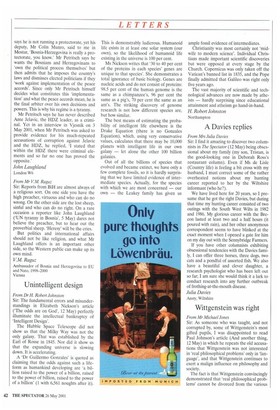Unintelligent design
From Dr H. Robert Johnston Sir: The fundamental errors and misunderstandings in Elizabeth Nickson's article (`The odds are on God', 12 May) perfectly illuminate the intellectual bankruptcy of 'Intelligent Design'.
The Hubble Space Telescope did not show us that the Milky Way was not the only galaxy. That was established by the Earl of Rosse in 1845. Nor did it show us that the expanding universe is slowing down. It is accelerating.
A `Dr Guillermo Gonzales' is quoted as claiming that the odds against such a lifeform as humankind developing are 'a billion raised to the power of a billion, raised to the power of billion, raised to the power of a billion' (1 with 6,561 noughts after it). This is demonstrably ludicrous. Humanoid life exists in at least one solar system (our own), so the likelihood of humanoid life existing in the universe is 100 per cent.
Ms Nickson writes that '30 to 40 per cent of the proteins in each species' genes are unique to that species'. She demonstrates a total ignorance of basic biology. Genes are nucleic acids and do not consist of proteins: 98.5 per cent of the human genome is the same as a chimpanzee's, 96 per cent the same as a pig's, 70 per cent the same as an ant's. The striking discovery of genome research is not how different species are, but how similar.
The best means of estimating the probability of intelligent life elsewhere is the Drake Equation (there is no Gonzales Equation), which, using very conservative values, calculates that there may be 10,000 planets with intelligent life in our own galaxy — let alone the other 100 billion galaxies.
Out of all the billions of species that evolved and became extinct, we have only a few complete fossils, so it is hardly surprising that we have limited evidence of intermediate species. Actually, for the species with which we are most concerned — our own — the Leakey family has given us ample fossil evidence of intermediates.
Christianity was most certainly not 'midwife to modern science'. Individual Christians made important scientific discoveries but were opposed at every stage by the Church. Copernicus was only taken off the Vatican's banned list in 1835, and the Pope finally admitted that Galileo was right only five years ago.
The vast majority of scientific and technological advances are now made by atheists — hardly surprising since educational attainment and atheism go hand-in-hand.
H. Robert Johnston
Northampton


















































































 Previous page
Previous page